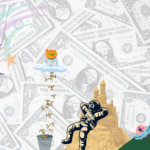
Market Update 13/2: Flames of stock buybacks
In Brief: Corporations are buying back stock at an unprecedented rate, which President Biden opposes, so the proposed new tax on buybacks would be quadrupled to 4%.

Stock buybacks by corporations have increased at an unprecedented rate – something President Biden disagrees with. During his state of the union address, Biden urged corporations to invest more of their profit in producing more products and less in stock buybacks. To entice them to do so, the proposed new tax on buybacks would be quadrupled to 4%.
Definition of stock buybacks
A stock buyback, also known as a share repurchase, is a financial strategy used by a company to purchase its own outstanding shares from the market. As a result of the act, there are fewer shares available for trading, increasing the ownership stake of existing shareholders and increasing the value of remaining shares. The purpose of buybacks can include enhancing financial performance, utilizing surplus cash, or returning value to shareholders.
Why does a company buy back stock?
Company stock buybacks can be attributed to a number of factors such as:
- Boosting Stock Price: By reducing the number of outstanding shares, the company can increase its earnings per share, making the stock more attractive to investors and boosting its price.
- Return Capital to Shareholders: By buying back its own shares, a company can return capital to its shareholders, giving them an opportunity to realize a profit on their investment.
- Enhance capital usage: A company may feel that buying back its own shares is a better use of its capital than investing in other areas of the business, such as research and development, capital expenditures, or acquisitions.
- Reducing Dilution: Stock buybacks can help to decrease dilution, which occurs when new shares are issued, reducing the value of existing shares.
- Company’s confidence assurance: A company that is buying back its own stock may be seen as having confidence in its future prospects and its ability to generate profits.
Buying back stock can be accomplished through open market purchases, tender offers, or Dutch auctions.
What is the impact of stock buybacks on capital costs?
Stock buyback programs could potentially reduce a company’s capital costs by increasing demand for shares and reducing supply, resulting in higher stock prices. When the stock price rises, the cost of equity capital decreases, which can lower the overall cost of capital. A company’s financial performance, market conditions, and investor sentiment all affect the company’s ability to reduce its cost of capital through buybacks alone.
How does stock buyback affect stock price?
Stock buybacks can have a positive impact on stock price, but the effect depends on several factors.
A stock buyback occurs when a company buys back its own shares from the market. This reduces the number of outstanding shares and increases the ownership of the remaining shareholders. This can increase earnings per share (EPS) and improve the company’s financial ratios, making it appear more attractive to investors.
However, a stock buyback is not always a positive signal for the market. If a company buys back its shares when the stock price is high, it may not be the best use of its resources, as it may not be getting the most value for its money. This can lead to a negative market reaction and a decrease in stock price.
Stock buybacks may also indicate a company does not have a viable growth strategy, instead relying on financial engineering to improve its stock price. An investor’s confidence may decrease as a result, and the stock price may decline as well. Nevertheless, the effect of a stock buyback on stock price is complex and depends on several factors, including market sentiment, company performance, and the timing of the buyback.
Stock buybacks - how big were they?
In January, $132 billion in planned buybacks were announced, more than triple the level of the year before.
Chevron
The company announced a $75 billion stock buyback on January 25, 2023, resulting in a dividend hike on Wednesday evening. In extended trading, Chevron shares rose more than 2%. For the third quarter alone, Chevron reported a free cash flow of over $12 billion and a net income of $11 billion.
The new buyback plan comes after a massive year for energy stocks, as a reopened U.S. economy and Russia’s invasion of Ukraine combined to drive oil and gas prices higher in 2022. According to a press release, the buyback program begins on April 1, with no expiration date set. Chevron’s dividend payout will increase to $1.51 from $1.42 on March 10, following the dividend hike.
Shares of Chevron rose more than 25% in 2022 even as the broader stock market declined.
Despite tech layoff, Meta, the parent company of Facebook, announces a $40 billion stock buyback.
Robinhood – Robinhood board approves plan to buy back Sam Bankman-Fried's $578 million stake.
Robinhood’s board of directors has approved a plan to buy up to 55M shares bought by Sam Bankman-Fried last year. Approximately 7% of Robinhood’s outstanding shares are held by Bankman-Fried, according to a January 20 filing by the DOJ. According to Wednesday’s close, that stake was worth more than $578 million. The stock’s price range is between $10.65 to $11.05.
Fed’s proposition towards stock buyback.

As outlined in his February 7 State of the Union address, the president’s proposal would quadruple a new 1% tax on stock buybacks by companies to 4%. President Biden’s proposal to increase corporate stock buyback taxes has been criticized by the U.S. Chamber of Commerce as harming American entrepreneurs and retirement savers.
The 1% tax on buybacks is actually brand new. Congress passed the tax in 2022 as part of the Inflation Reduction Act. It took effect at the beginning of 2023 and only affects buyback programs of $1 million or more. The new 1% tax was enacted as part of the Inflation Reduction Act last year and became effective on January 1. In general, it applies to corporations that repurchase more than $1 million in stock over a given tax year that trade on an established securities market.
In 2018, then-President Donald Trump said he was unhappy with companies that used the money saved from his 2017 tax cut to buy back shares rather than build domestic factories. In a 2020 debate over Covid-19 relief, Senator Elizabeth Warren of Massachusetts noted that the five biggest US airlines — prime targets for the government bailout funds — had spent 96% of their free cash flow on stock repurchases over the previous decade.
Why the government doesn't prefer a company to buy back its stock?
Many critics contend that share buybacks are short-sighted and don’t create any real value. The argument is that companies should use more of their profits to invest in more productive activities such as operations, innovation, and personnel.
Returning money that a company makes to stockholders does mean less capital is available for other investments. According to Biden, the record profits they have earned from high energy prices have been used to buy back their stock instead of investing in new wells that will increase supply and reduce gas prices.
But the decision of whether to invest to increase domestic production is a complicated one. For example, the reason companies aren’t investing in new wells right now is not simply because they are buying back stock. The reason has more to do with how oil companies, and their shareholders, don’t think it is profitable to invest in more supply for a whole host of reasons, including the global push for greener energy by both policymakers and consumers, which is bound to reduce demand for fossil fuels in the future.
Another major reason is conflicts of interest. It occurs because stock buybacks are usually perceived as a benefit to shareholders and management as they own shares.
Stock buybacks are also often criticized for benefiting wealthy shareholders and executives, rather than workers or the broader public. This can lead to increased income inequality and reduced support for the company. Plus, the company’s financial resources also can lead to financial drainage. It reduces its ability to invest in future growth and development. This can be seen as a short-term approach that may not be in the best interests of the company or the economy as a whole.
Would increasing the tax result in fewer buybacks?
But early data from 2023 suggest the 1% tax isn’t significantly deterring buybacks. Companies announced $132 billion in buybacks in January, three times as much as a year earlier and the most for the month on record.
However, will the 4% tax withdraw the company’s upcoming decision? I personally don’t think that will happened.
Bottom Line
There are a variety of reasons why a large corporation decides to allocate capital – whether to build a factory, hire more employees, or buy back stock – and they are never taken lightly. Decisions like these have many aspects and implications, and they are not necessarily bad. Next time you hear politicians say things like “corporations should do what is right,” I believe this is something that is worth keeping in mind.
The key takeaways/market update is a series by AxeHedge, which serves as an initiative to bring compact and informative In/Visible Talks recaps/takeaways on leading brands and investment events happening around the globe.
Do keep an eye out for our posts by subscribing to our channel and social media.
None of the material above or on our website is to be construed as a solicitation, recommendation or offer to buy or sell any security, financial product or instrument. Investors should carefully consider if the security and/or product is suitable for them in view of their entire investment portfolio. All investing involves risks, including the possible loss of money invested, and past performance does not guarantee future performance.






